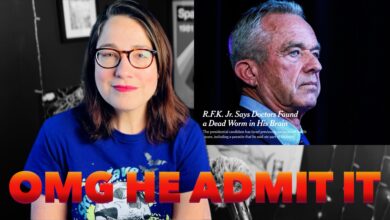Radiolab Fail
I’m normally a fan of NPR’s Radiolab podcast. Sure, it tends to be fluffy, but it’s interestingly produced and tackles science in a way that emphasizes human curiosity and wonder and appeals to a wide audience. The latest episode, a short titled The Universe Knows My Name, shot clear past a ton of fascinating science and straight into the worst kind of inane mystery mongering.
The show is all about luck and fate; the ways in which the universe can seem to be playing games with our lives. Hosts Jad and Robert interview writer Paul Auster, who shares ostensibly true strange tales about coincidences and “rhyming events” from his life and the lives of his friends.
Cut to a fun interview with a cartoon historian (I want to know how one acquires such a title), discussing the enduring popularity of Coyote and Roadrunner cartoons. He speculates that people tend to relate to the coyote’s situation, utterly at the mercy of an antagonistic universe that will never give him a break. It satisfies a very primal egotistical urge in us. In a way, we want to believe that yes, the universe does know who we are, even if it is always out to get us.
The show ends with one more story from Auster, closing with his conclusion that these events are “inexplicable, but interesting”.
NO! NO! NO!
I was totally with them until “inexplicable”. It was a great intro with relatable human stories which could have set us up to dig into the science of probability, coincidence, and luck. And then it went nowhere. They left it without even an inkling of a notion that there actually is science on this stuff. Richard Wiseman’s books are full of insights into these kinds of events, and why they can seem so significant to us, yet be largely unremarkable in the grand scheme of things.
Every minute, billions of people have trillions of tiny, momentary experiences. It’s a simple numbers game to figure out that seemingly strange alignments and coincidences are utterly ordinary from a cosmic perspective. A one in a million chance of something happening becomes an inevitability in the face of those odds.
This is not to say that I don’t find such experiences to be of value. I’m not dismissing the stories. I think they’re wonderful and human. But they’re just the beginning. Exploring the hows and whys of such stories with real science makes them even better. This installment of Radiolab missed that entirely.
Further material on the topic:
Richard Wiseman interviewed on Dateline about the science of luck





We had a mini discussion about this in the comments with one of last week’s Skepchik Quickies – http://skepchick.org/blog/2011/01/skepchick-quickies-1-5/
For a science podcast, it’s kind of hit or miss with actual science for the topics. As I mentioned before, this kind of reporting is why I have a hard time listening to Robert Krulwich on RadioLab when he goes off on spiritual tangents. I think @B Hitt can agree with me on this.
Indeed. I haven’t heard this episode, but from Carrie’s description I’m not at all surprised. The primary goal of the show seems to be to make listeners say “Wow, it’s cool to think about that!” It’s a good goal. But there is plenty of real science that will more than suffice for that purpose. The manufactured mysteries are a distraction.
I love coincidence stories! In the early 70’s I picked up two hitchhiking girls in Dallas.They asked if I could give them a ride home.So I said “Sure,where do you live?”. One of the girls started giving me directions like “turn here,go down this street,next left” and so on until they took me directly to the house that I had grown up in some 10 years earlier.I was understandable amazed,and animated about it,telling them “This is unbelievable! I use to live here!” They looked at me like this was some pathetic attempt to pick them up,and said “Yeah,sure,but thanks for the ride though”,and went inside.
I think alot of irrational thinking is based on egotism.
We exist, therefore an all powerful being must have made us on purpose.
v.
We exist, a likely event if you consider the size and age of the universe.
Remember, if the odds of an event are one in a million, it will happen to roughly 7,000 people.
Great post and thanks for those links. I want a bumper sticker that says “I believe in coincidences”. That people jump to conclusions drives me nuts sometimes. My mom got a flu shot once in her life and caught a cold right afterward. She won’t get a flu shot to this day. My friend got sick after going out without drying her hair. Blames it on that. And now that I’ve moved to Southern California I get to hear about “earthquake weather” because there have been earthquakes when it was unseasonably warm. Aaargh! Evidently this post has touched on a pet peeve.
@hkdharmon
Exactly, it’s like drawing the bullseye around your arrow after you’ve shot it. It’s so unlikely how could it be true? This type of thinking is thick in conspiracy theories.
I saw a show in which they recreated the shot that killed Kennedy. The shot was incredibly close to what really happened; except the bullet hit three ribs instead of two so it didn’t penitrate the thigh analog.The bullet ended up bent like in real life and everything. This doesn’t, of course, prove that Oswald made that shot it just proved that he could have. The impossible was reduced to just unlikely, hardly enough to hang a conspiracy on.
@mrmisconception
Sorry, I should have said the so-called magic bullet shot not the fatal shot, though they did that one to. It moved back and to the left for them too by the way.
Anyone seen Derren Brown’s special “The System?” Highly, highly recommended, find it on YouTube. It reveals the flaws in this kind of thinking in a a really salient way.
In the middle of the special, he has a short bit with an uninterrupted shot of him flipping heads on a coin 10 times in a row, then revealing how he did it (flipping a coin for hours).
The main story follows a woman to whom Derren has been sending horse racing tips based on some alleged betting “system.” She has won on something like 5 races in a row and agrees to place a huge bet on the horse he picks for one final race. I won’t spoil the ending for those that want to watch it, but you guys are skeptics, I’m sure you know how he did it. In his explanation, he ties in the problem of anecdotal evidence for the effectiveness of homeopathy – Awesome! Teaching critical thinking through entertainment.
In a related article, this discusses Texas Sharpshooter issues wrt successful economic pundits.
http://www.boston.com/bostonglobe/ideas/articles/2011/01/09/that_guy_who_called_the_big_one_dont_listen_to_him/?page=full
The book they mention “Expert Political Judgment†by Philip Tetlock is excellent.
I have a similar love/hate relationship with Radiolab. Robert and Jad are excellent story tellers and have a knack for explaining complicated ideas in simple ways. Where they fall down is a general lack of science expertise and critical thinking. They are at the mercy of whoever they are using for source material. This episode was a classic case of garbage in, garbage out.
That’s a real shame, particularly in light of their episode “Stochasticity” which is a fantastic introduction to how confirmation bias works. Haven’t heard the new one yet, but it’s a shame they didn’t go back and listen to that one before they produced this one. :\
@davew: Ditto. I really love the show, but I feel like they really hamper themselves sometimes with who they choose to interview. And there have been several occasions where I was excited for a topic that I have some knowledge of, but then they don’t go as deeply into as I would have liked and, in my opinion, they end up cutting out important bits of a story. But I suppose they have time / editorial constraints to deal with like everyone else.
@porlob: I haven’t listened yet either, but that’s the first thing I thought of after reading Carrie’s article. I thought “But they did a WHOLE SHOW about coincidence, improbable things and statistics! Arghhh!”
@porlob: I’m with you on this one, my first thought was that they just completely forgot all about their own Stochasticity episode. Sad.
I just listened to this one this morning, complained about it on twitter, then found that all of you have been talking about it for a day already. I love that.
It’s been my experience that Radiolab’s full-length episodes have an excellent balance of critical thinking to bullshit. It’s the podcasts (which this one was) that can tend to lean one way or the other, probably because they’re explicitly made to get content out there quickly. I’m sure a regular episode must take weeks to plan and execute, not to mention the painstaking sound engineering Jad does.
But seriously, it’s like they forgot they did the Stochasticity episode. That story about how the guy got two wrong number calls for the same person in two days, wrote a book inspired by that small event, then years later gets one wrong number call asking for the same name as in the book he wrote? Even if I wasn’t a skeptic, I’d say that’s a pretty anemic connection.
@hamertime: I’m pretty sure that was a Steven Wright joke. He keeps getting wrong number calls asking for Fred. Finally one day, he gets a call: “This is Fred. Are there any messages for me?”